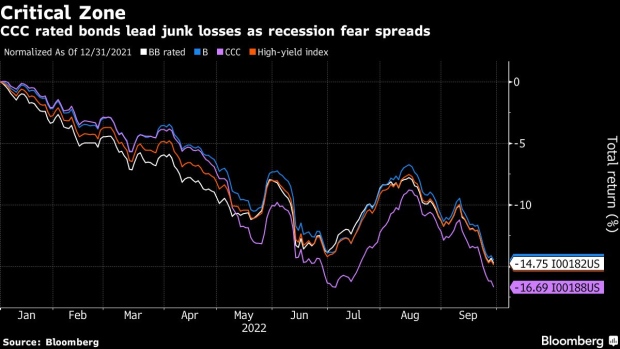Sep 30, 2022
Credit Market Moves Toward Breaking Point as Investors Flee, Sales Flop
, Bloomberg News

(Bloomberg) -- Credit markets are starting to buckle under pressure from soaring yields and fund outflows, leaving strategists fearing a rupture as the economy slows.
Banks this week had to pull a $4 billion leveraged buyout financing, while investors pushed back on a risky bankruptcy exit deal and buyers of repacked loans went on strike. But the pain was not confined to junk -- investment-grade debt funds saw one of the biggest cash withdrawals ever and spreads flared to the widest since 2020, following the worst third quarter returns since 2008.
“The market is dislocated and financial stability is at risk,” said Tracy Chen, portfolio manager at Brandywine Global Investment. “Investors are going to test central bank resolve,” she said in a phone interview.
In a sign of just how dire things are starting to become, a measure of credit stress tracked by Bank of America Corp. jumped to a “borderline critical zone” this week. “Credit market dysfunction starts beyond this point,” strategists Oleg Melentyev and Eric Yu wrote in a note Friday entitled “This Is How It Breaks.”
More pressure is expected as the Federal Reserve continues to tighten the screws on financial markets, raising funding costs at a time when earnings are pressured by a slowing economy.
The riskiest bonds, rated CCC, are leading high-yield losses. The average CCC rated debt is down almost 17% this year, worse than the 15% drop for junk overall.
Read more: Brightspeed Debt-Sale Failure Slams Banks Anew After Citrix Flop
“You are really starting to see CCC pricing in concerns for a recession,” said Manuel Hayes, senior portfolio manager at Insight Investment. Hayes is buying bonds that are better positioned to ride out a downturn, calling BBB rated bonds, the lowest tier of investment grade, the “sweet spot.”
A general move away from debt that’s most exposed to an economic downturn has widened the gap between risk premiums for BB and B rated debt to the highest since 2016. At the same time, the average high-grade spread hit 164 basis points Thursday, the widest in more than two years.
And the pain is spreading to all corners of credit, including structured products. Collateralized loan obligation prices are dropping as Wall Street banks retreat from buying the securities, pressured by regulators. That will likely dent issuance of CLOs, the biggest buyers of leveraged loans. The average price for the floating-rate loans dropped to about 92 cents on the dollar and investors don’t see calm returning to markets anytime soon.
A key spread on mortgage-backed securities meanwhile hit a two-year high after the Fed stepped back from the market.
“A recession is a forgone conclusion, if we aren’t tipping into one already,” said Scott Kimball, managing director at Loop Capital Asset Management. “The question is the duration and severity and none of that improved during the quarter.”
Sales of corporate bonds in Europe slumped to the lowest for any comparable period since at least 2014, while the usually booming month of September underwhelmed with the worst sales since the same year, according to data compiled by Bloomberg. As funding costs are driven up, it’s creating a bleak picture for the region’s firms.
Globally, at least 10 bond deals were either delayed or canceled in September, up from just the one in August, according to data compiled by Bloomberg. That’s the highest since June, following a rare period of stability in the summer.
Elsewhere in credit markets:
Americas
US junk bonds are headed for worst year-to-date losses on record as the Federal Reserve maintains a hawkish stance to tame inflation.
- In the investment-grade primary bond market, there were no new issuers on Friday, wrapping up an abysmal week that saw just $1.7 billion sold
- The cruise sector is rebounding slower than expected with cruise line companies Carnival and Royal Caribbean seeing bond prices drop on Friday
- Mortgage backed securities are presenting one of the most attractive entry points of the last 10 years given a combination of yield and low prepayment risk, an analyst wrote
- For deal updates, click here for the New Issue Monitor
- For more, click here for the Credit Daybook Americas
EMEA
The region’s primary bond market missed expectations for issuance, at just over €15 billion ($14.7 billion), with Friday being the 39th day without sales this year.
- Banks funding the acquisition of House of HR’s are likely to keep about a quarter of the deal on their balance sheets, adding to the billions of hung debt stuck on lenders’ books
- In the UK, gilts have seen some respite after a recent selloff on optimism surrounding the government’s meeting with the Office of Budget Responsibility
- Sustainable sales are setting records in Germany’s Schuldschein debt market, reaching more than €8 billion in the first three quarters of the year, topping previous full-year totals
Asia
The tiny leveraged loan market is outshining the US and Europe, with banks in the region based outside Japan enjoying one of their best years, posting a 40% year-over-year increase in sales by September, according to data compiled by Bloomberg.
- Chinese high-yield dollar bonds are on pace for their biggest weekly loss since March, capping a seventh-straight quarterly decline, as debt worries about developer CIFI sent its notes plunging
- India’s primary market was slow Friday, with borrowers and investors awaiting a fresh interest-rate decision from the nation’s central bank
©2022 Bloomberg L.P.






